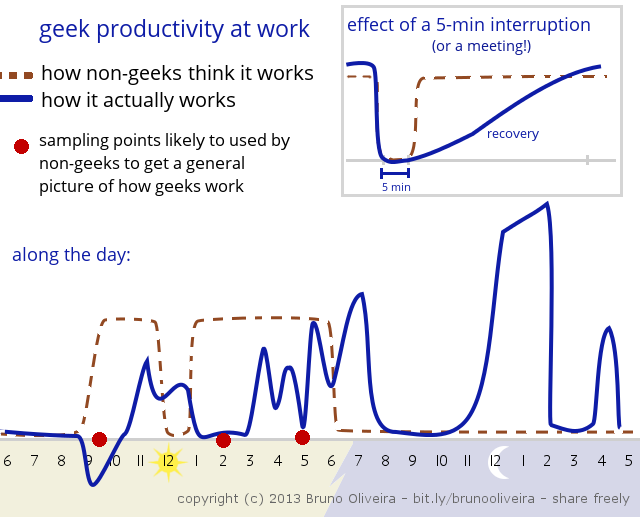There is never enough time to do everything, but there is always enough time to do the most important thing.
The problem is that the most important thing at 9am may not still be the most important thing at 5pm, at 1pm, or even at 9:01 am.
When a pebble interrupts the stillness of a pond, the water responds just enough to accomodate the pebble. Ripples spread out across the surface. The pebble sinks to the sandy bottom. The surface is soon tranquil again. The interruption doesn’t throw off the pond’s entire day.
The basic process of daily productivity is simple:
- Prioritize your tasks for the day
- Complete your most important task
- Work down your list
- Do it again tomorrow
However, this only works in a bubble. You probably don’t work in a bubble. You have coworkers. You have customers and clients. You have a phone, email, and a web browser. And you’re human.
Interruptions will kill your productivity. Tasks take longer, even when you factor out the time spent on the interruption. Mistakes creep in as you lose continuity and focus. You feel stressed out.
Do everything you can to minimize interruptions. Check for mail less frequently. Put your phone on Do Not Disturb. Put on headphones, even if you don’t listen to anything. An ounce of prevention is worth a pound of cure.
Not all interruptions can be prevented. It may even be your job to be interrupted. If that’s the case, don’t stress out at the interruption—remind yourself you’re doing real work.
When you plan your day, allow for interruptions. Estimate how much you can get done today, then schedule half of that for today and half for tomorrow. If you finish today’s tasks (congratulations!) you can always get ahead by starting on tomorrow, or you can take a well-deserved break. If you really want to get ahead, spend some of that bonus time in Quadrant 2.
Anything that truly needs to get done today should be considered a big rock. Schedule it.
What do you do with the gravel that comes in?
The main benefit of planning your day is that you know what you’re facing when interruptions come in. You have a prioritized list of what you need to do today—use it! When an interruption comes in, see where it fits on your list.
- If the interruption is more important than what you’re currently working on, find a good point to set aside your current task and change gears.
- If the interruption is less important than your least-important task for the day, just put the task in your inbox. You’ll process it later.
- If the interruption is somewhere in between, work your way down your prioritized list for the day until you find an appropriate place for it.
A plan is often worth less than the paper it’s written on. Priorities change. I couldn’t tell you the number of days I’ve spent fixing something I didn’t even know was broken when I arrived at work. Or working on a feature I hadn’t planned to get to for another couple weeks. Or helping a coworker get something working for a demo.
The power and value of planning isn’t the plan you come up with. It’s the clarity you get on what you have to get done. When interruptions, problems, obstacles, and opportunities arise, you know how to handle them. A plan is nothing, but planning is everything.
Question: How do you handle interruptions and return to the peace of your productive day? Share your thoughts in the comments, on Twitter, LinkedIn, or Facebook.


